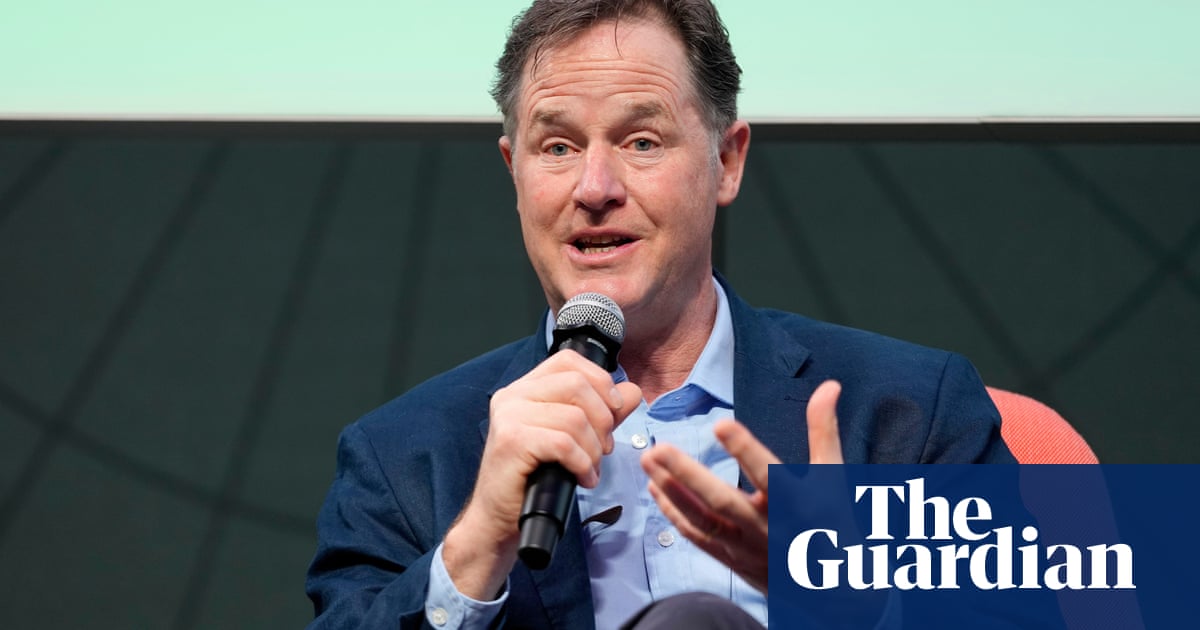Hello, and welcome to TechScape. Happy New Year! May dry January leave us all with fewer headaches. Today in TechScape: Meta promotes a Trumpian bulldog, TikTok faces mounting problems that aren’t a ban, Meta faces backlash against its approach to AI and Elon Musk meddles abroad.
Nick Clegg, the former deputy prime minister of the United Kingdom, is now the former head of global affairs at Meta. He announced his resignation on Thursday after six years at the tech giant. He spent two years in the company’s top policy job.
In the announcement of his departure, Clegg wrote: “It truly has been an adventure of a lifetime! … I hope I have played some role in seeking to bridge the very different worlds of tech and politics.” He sold almost $19m worth of Meta shares during his time at the company, and he holds some $21m more. He may return to British politics, as the party he once led, the Liberal Democrats, won a record number of seats at the general election last year.
You can see in Clegg’s book titles how he was a politician of a less polarized era: Politics: Between the Extremes (and How To Stop Brexit (And Make Britain Great Again). He made neither of his two shots on goal with these books: we live in extreme times, and Brexit was not stopped. Donald Trump is president of the US once again, and Meta’s home country has shifted further to the right than when Trump first won the White House. The former Facebook chief operating officer Sheryl Sandberg, so well-connected in Democratic circles, isn’t even on Meta’s board any longer. Clegg no longer fits the times.
Clegg is a centrist, asserting in 2011 that his party’s politics were that of the “radical centre”. More than a dozen years later, political centrism has collapsed, unable to compete with the superlative appeal of the extremes, especially on Facebook.
Clegg is also a globalist in a time of protectionism and nationalism, having managed the European Commission’s trade negotiations with China and Russia in his earlier career. A global policy perspective makes financial sense at Meta, which boasts users in every cranny of the world. Such a viewpoint runs counter to “America First”, which is a problem when Mark Zuckerberg is giving $1m to Trump’s inaugural fund and showing off Meta Ray-Bans over dinner at Mar-a-Lago.
Replacing Clegg is his right-hand man, Joel Kaplan, hired in 2011. The promotion prefigures a more partisan era for Meta as a company and Facebook as a social network. Kaplan has championed conservative causes inside and outside Meta. Within, he has pushed Meta to partner with rightwing news websites on factchecking; placed prominent Republicans in key roles; and advocated for Facebook not to restrict fake news, arguing such a crackdown would unfairly penalize conservatives. Without, he championed the nomination of the conservative justice Brett Kavanaugh to the US supreme court. When Kavanaugh was called to testify about allegations of sexual assault, Kaplan sat behind him, visible on the aisle seat of the Senate chamber.
Social networks are inextricable from the politics of the past 15 years, so we can infer that they had a hand in centrism’s demise. Kaplan has successfully argued for fewer algorithmic restrictions on Trump on Facebook. It’s ironic that both Clegg’s employer and top deputy helped tank his favored political philosophy.
Clegg said he hoped to bridge the tech industry and politics. Kaplan, I predict, will take an approach that treats the two as one and the same. In 2025, they are. Having served in George W Bush’s White House alongside Karl Rove, Kaplan is already enmeshed in Republican networks. He’s enmeshed in conservative American politics. Whether or not you agree, his profile fits the tide of the moment: Elon Musk is unavoidable at Mar-a-Lago. Venture capitalists are taking on official White House roles and unofficial advisory positions. Silicon Valley’s rightwingers are inseparable from San Francisco’s politics. With Kaplan ascendant, Meta is well-positioned to take advantage of Trump’s presidency.
TikTok faces a second war in the US: child exploitation lawsuits
If TikTok evades a ban in the US – unlikely at this point, in my opinion – it faces another problem: a spate of lawsuits by state attorneys general over the video app’s alleged use in child exploitation. My colleague Dara Kerr reports:
TikTok has long been aware that its video livestream feature has been misused to harm children, according to newly revealed details in a lawsuit brought against the social media company by the state of Utah. Those harms include child sexual exploitation and what Utah calls “an open-door policy allowing predators and criminals to exploit users”.
The state’s attorney general says TikTok conducted an internal investigation in which it discovered adults paid teens to “strip, pose, and dance provocatively” using its livestream feature, known as TikTok Live. Another internal investigation showed TikTok Live was used to launder money, sell drugs and fund terrorist groups, according to the lawsuit.
Utah’s case against the company is part of a groundswell of lawsuits brought by US attorneys general over alleged exploitation of children. In October, 13 states and the District of Columbia filed lawsuits against TikTok on grounds similar to Utah.
Read more: TikTok knew its livestreaming feature allowed child exploitation, state lawsuit alleges
Meta’s approach to generative artificial intelligence is to integrate it into every distribution point at the company’s disposal. Any search bar in a Meta product – Whatsapp, Instagram, Facebook, Messenger – now hosts an iridescent blue circle that you may have clicked on by accident. Zuckerberg is fond of saying the company’s AI is the most used in the world. On Friday, though, the company reckoned with backlash against its experiment with entirely AI-generated profiles on its social networks that were managed by the company itself. Meta’s intention, stated to the Financial Times, undergirds the particular profiles mentioned here and imbues them with a more foreboding quality. My colleague Johana Bhuiyan reports:
after newsletter promotion
Meta deleted Facebook and Instagram profiles of AI characters the company had created over a year ago after users rediscovered some of the profiles and engaged them in conversations, screenshots of which went viral.
The company had first introduced these AI-powered profiles in September 2023 but killed off most of them by summer 2024. However, a few characters remained and garnered new interest after the Meta executive Connor Hayes told the Financial Times late last week that the company had plans to roll out more AI character profiles.
“We expect these AIs to actually, over time, exist on our platforms, kind of in the same way that accounts do,” Hayes told the FT. The automated accounts posted AI-generated pictures to Instagram and answered messages from human users on Messenger.
Read more: Meta is killing off its own AI-powered Instagram and Facebook profiles
Elon Musk meddles abroad
Elon Musk is increasingly reaching his long fingers into the politics of other nations. He has endorsed Germany’s far-right AfD party in an op-ed. He spent the weekend tweeting at a furious volume about “grooming gangs” in the UK. He has called on British politicians to free the jailed far-right anti-Islam agitator Tommy Robinson, which led him to rebuke the Reform UK leader Nigel Farage, whom Musk only just met at Mar-a-Lago a few weeks ago.
In France, Emmanuel Macron has given his opinion on the influence of the world’s richest man, in particular Musk’s endorsement of the AfD: “Ten years ago, who would have imagined that the owner of one of the world’s largest social networks would be supporting a new international reactionary movement and intervening directly in elections, including in Germany.”
Musk is beginning to take an interest in Canadian politics, which is where I think he’ll focus his full attention next. Justin Trudeau has resigned, and Musk tweeted “great interview” about Jordan Peterson’s conversation with the conservative Canadian politician Pierre Poilievre on 2 January.
On the morning of 6 January, the fourth anniversary of the pro-Trump insurrection attempt at the US Capitol, Musk asked his followers on X to vote in a poll: “America should liberate the people of Britain from their tyrannical government.” Roughly two-thirds of them voted yes.
In the few remaining weeks before Trump assumes office, American politics seem to be in Musk’s rearview mirror. He is, however, still tweeting Rick and Morty screenshots about how taxes pay for the lavish lifestyles of elite pedophiles, continuing his descent into Pizzagate territory, a distinctly American phenomenon.











